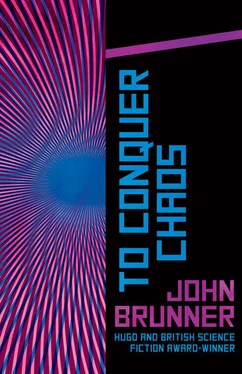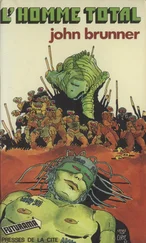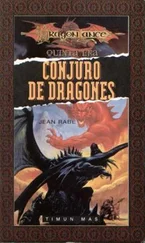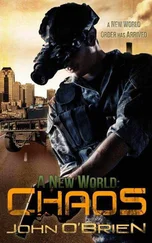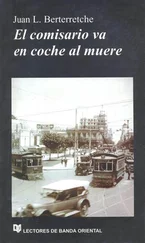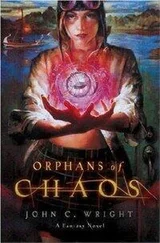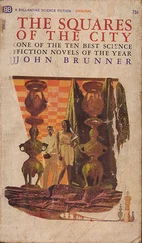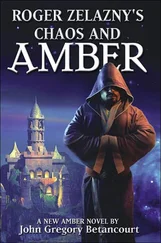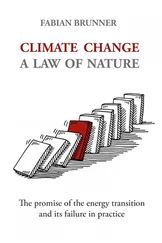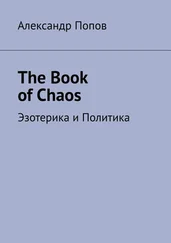John Brunner - To Conquer Chaos
Здесь есть возможность читать онлайн «John Brunner - To Conquer Chaos» весь текст электронной книги совершенно бесплатно (целиком полную версию без сокращений). В некоторых случаях можно слушать аудио, скачать через торрент в формате fb2 и присутствует краткое содержание. Год выпуска: 2011, ISBN: 2011, Издательство: E-Reads, Жанр: sf_postapocalyptic, на английском языке. Описание произведения, (предисловие) а так же отзывы посетителей доступны на портале библиотеки ЛибКат.
- Название:To Conquer Chaos
- Автор:
- Издательство:E-Reads
- Жанр:
- Год:2011
- ISBN:9780575101296
- Рейтинг книги:4 / 5. Голосов: 1
-
Избранное:Добавить в избранное
- Отзывы:
-
Ваша оценка:
- 80
- 1
- 2
- 3
- 4
- 5
To Conquer Chaos: краткое содержание, описание и аннотация
Предлагаем к чтению аннотацию, описание, краткое содержание или предисловие (зависит от того, что написал сам автор книги «To Conquer Chaos»). Если вы не нашли необходимую информацию о книге — напишите в комментариях, мы постараемся отыскать её.
To Conquer Chaos — читать онлайн бесплатно полную книгу (весь текст) целиком
Ниже представлен текст книги, разбитый по страницам. Система сохранения места последней прочитанной страницы, позволяет с удобством читать онлайн бесплатно книгу «To Conquer Chaos», без необходимости каждый раз заново искать на чём Вы остановились. Поставьте закладку, и сможете в любой момент перейти на страницу, на которой закончили чтение.
Интервал:
Закладка:
With a howl far louder than any preceding, the thing felt the first effects, and panic took over. Nestamay hadn’t seen whether it had legs or not, but it must have done; nothing else but good, muscular legs could have carried its substantial mass out of the channel so fast. Off into the surrounding desert it fled, trumpeting its intolerable pain to the stars.
It might come back-if it was stupid enough. Men with heatbeams would have to watch for it for the next few days, which meant taking people away from the regular working parties. Not all the things were as bad as that-some were huge and harmless, some were little and harmless … and some were little and deadly, and they were the worst of all. But it had been a long time since anything in a swarm, which was particularly frightening, had hatched out in the Station.
Nestamay wiped her face; it was running with sweat. Now she had to trace the original point of emergence of the thing, so that it could be blanked off for ever.
Was there never to be an end to this existence? Would they never find the last hole through which things leaked from-wherever they originated?
Those were questions she knew she couldn’t answer. She drove them from her mind and went about her work.
VII
The five wise men, Yanderman himself, and the servants who came and went with jugs of beer and plates of cheese and onions made the room crowded. The ceiling was low and the walls were rough. The layout suggested to Yanderman that this fort had been the whole of Lagwich at one time, with perhaps a mere hundred people living in crude cabins around it and taking refuge inside the stone wall when necessary; the palisade and ditch lower down the hill would have followed the expansion of the population to its present figure of eight or nine times the original number.
Six nitre-soaked torches, fizzing and spitting occasionally, were set in wall sconces among relics of past victories-not military conflicts, but struggles against things from the barrenland. Some of the trophies were mounted as skeletons; others were skins stretched on crude wooden frames. Even in death the ugliest of them were still frightening.
He had thought through the probable history of Lagwich with a purpose-as a sort of exercise in deduction. These five who called themselves wise men and governed the town were very ignorant even when it came to facts lying in plain sight. Like the form their town had taken. They might say, “in the time of my father’s father it was said that the palisade was smaller than it is now,” or “That thing on the wall was killed by so-and-so, who killed sixty-nine things in twenty years-they came more often then.”
In fact, Malling had said exactly that when waiting for the others to arrive. Yanderman found the words disturbing, for a reason he could not yet pin down.
So far he had confined the talk to an exchange of courtesies and some restrained boasts about the wealth of Esberg; they were true enough, but he had no wish to make the folk of Lagwich feel small. They had done well, considering their situation. Of course, they’d have done better if they hadn’t been so stupidly ignorant. How could they say what they said about change or growth, and yet not grasp the idea that things were still changing, even if the world seemed much as yesterday?
Now, Yanderman decided, he could introduce his main topic. Since he was the honoured guest and the centre of attention he had only to clear his throat and they instantly hushed to hear him. He said, “The barrenland seems to me a strange thing. There is nothing else like it.”
The wise men rumbled and agreed. Yanderman went on, “The things that come from it, also, are very strange.”
They agreed to that, too.
“Tell me,” Yanderman said, “what do you believe caused the barrenland?”
As he had expected, the question provoked a blank silence. Eventually Rost, a dried-up man on Malling’s right, gave a shrug. He said, “Caused it? It’s a thing that is, like any natural object. And to speculate on what caused things to be as they are is a futile pastime.”
The other wise men concurred, looking relieved.
“The world changes, though,” Yanderman said. “For example, did you not tell me that in the old days more things came from the barrenland than come nowadays?” He looked at his host.
Malling was big, and ruddy-cheeked, and Yanderman would have guessed if no one had told him that he was the senior of the five, because he was much the most conservative. He said, “I concede that is so. Nonetheless those that come are if anything more dangerous than before. And the ways of devils are not as plain as the ways of men.”
“Devils?” Yanderman said. “All the things I’ve seen were animals, for they could be killed. What is a devil?”
“Oh, we have seen one,” the wise men hastened to assure him. “It’s in Rost’s house, across the yard of the fort.”
Yanderman, wondering what in the world they meant, showed his interest, and Malling obtained Rost’s permission to send a servant for the “devil”.
“This one,” Rost explained, “came from the barrenland not so many years ago-ten, or twelve. It had a voice, as I myself heard, and formed some sounds like words, and for some time there was argument to and fro as to whether it was a natural being. It was weak, and could easily be restrained, though sometimes it struck out at those who went near it. In the end it was agreed by the wise men of the time-I had not been chosen then-that since it had been seen to come from the barrenland it could not be a natural creature. There it is.”
Yanderman started forward from his chair with an oath, and plucked a torch from the wall as he halted near the door. Two brawny servants were carrying through the narrow opening the “devil” that Rost had spoken of.
And it was a man.
The corpse had been desiccated to preserve it-probably by exposure to hot sun and dry wind, while shielded from flies and carrion-eaters. Now its skin was stretched drum-tight, yellow in the flickering light, over the skull and ribs. The internal organs had been removed, so that below the ribs there was a hollow, but the arms and legs also had the skin on them. The feet were nailed to a wooden platform, and thongs had been threaded into holes in its back to tie the spine to a supporting post. It was very dusty.
“But that was a man,” Yanderman said slowly. Under his breath he added, “Poor ‘devil’!”
“It was not,” insisted Rost and Malling simultaneously. “Men do not live in the barrenland. Therefore it was a devil. True, it took the semblance of a man, but perhaps that was because we had killed so many of the other monsters that it tried to disguise itself.”
Yanderman ignored their babbling. He had the mummy brought into the middle of the room and studied it minutely. Whoever this man had been, he was not of a stock that Yanderman recognised; his head was much rounder than most people’s, his cheekbones were higher and his jaw shorter.
But he was certainly human. And he had come out of the barrenland, where nothing was supposed to exist except monsters …
He turned to the wise men. “Is it not possible that he was from another village-town-close to the barrenland, and wandered into it and then out again, close to Lagwich?”
“Impossible,” Rost hastened to assure him. “For one thing, he was different in certain ways from any man we have ever seen-his build, the colour of his skin. For another, we sent to inquire of all the other towns we could, and heard no account of any such man being lost.”
So either he had come from the far side of the barrenland, or …
Читать дальшеИнтервал:
Закладка:
Похожие книги на «To Conquer Chaos»
Представляем Вашему вниманию похожие книги на «To Conquer Chaos» списком для выбора. Мы отобрали схожую по названию и смыслу литературу в надежде предоставить читателям больше вариантов отыскать новые, интересные, ещё непрочитанные произведения.
Обсуждение, отзывы о книге «To Conquer Chaos» и просто собственные мнения читателей. Оставьте ваши комментарии, напишите, что Вы думаете о произведении, его смысле или главных героях. Укажите что конкретно понравилось, а что нет, и почему Вы так считаете.
